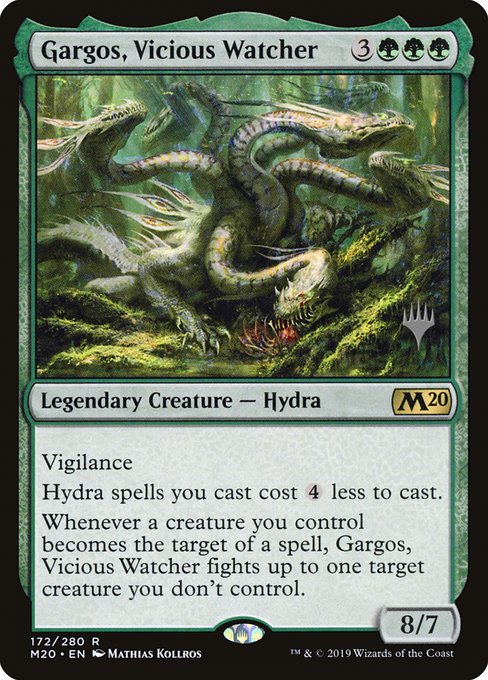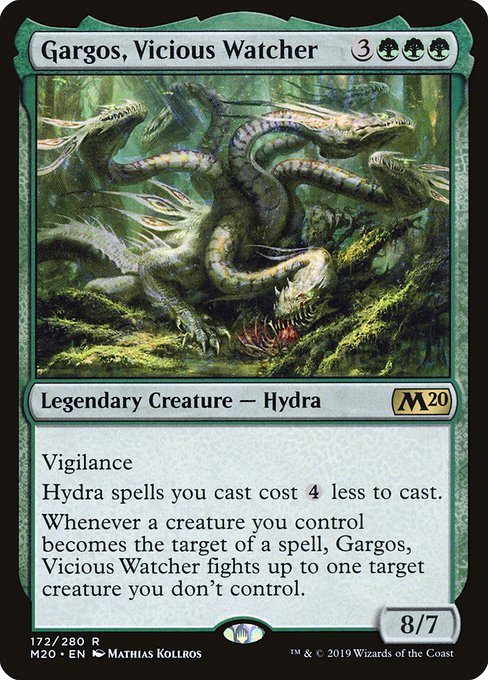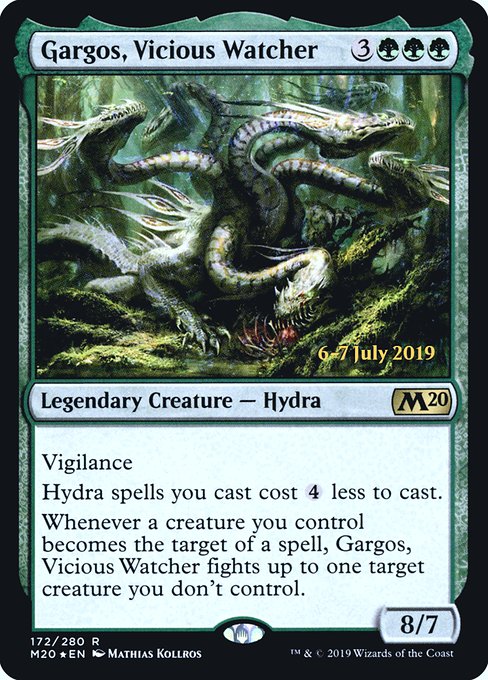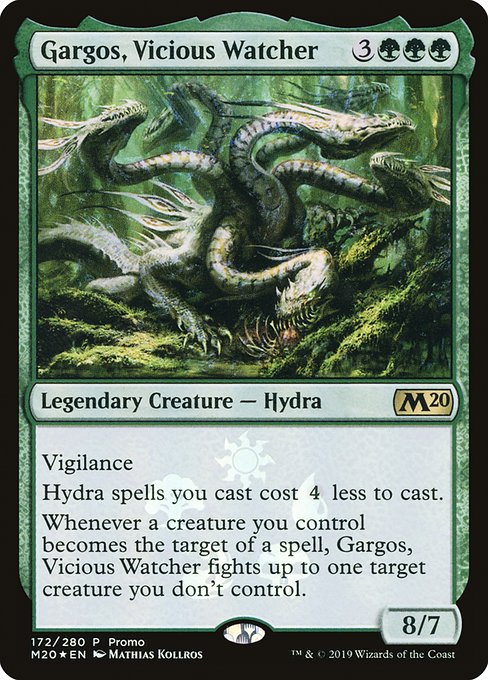standard
future
historic
gladiator
pioneer
explorer
modern
legacy
pauper
vintage
penny
commander
brawl
alchemy
paupercommander
duel
oldschool
premodern
Rulings
To determine the total cost of a spell, start with the mana cost or alternative cost you’re paying, add any cost increases, then apply any cost reductions (such as that of Gargos). The converted mana cost of the spell remains unchanged, no matter what the total cost to cast it was.
Gargos’s cost-reduction ability applies only while it’s on the battlefield. Gargos doesn’t reduce its own cost.
Gargos’s cost-reduction ability affects only generic mana in a Hydra’s cost. For example, if you cast a Hydra spell with mana cost , it will cost to cast, not .
If the target creature is an illegal target when Gargos’s last ability tries to resolve, the ability doesn’t resolve. If Gargos is no longer on the battlefield, the target creature won’t deal or be dealt damage.
If a spell has in its mana cost, you choose the value for X before applying cost reductions. For example, if you cast a Hydra spell with mana cost and choose for X to be 6, you pay . Any of that Hydra’s abilities that refer to X still uses 6 as the value for X regardless of what you actually paid.
Gargos’s triggered ability resolves before the spell that caused it to trigger. It resolves even if that spell is countered.
If a spell targets one creature you control multiple times, Gargos’s ability triggers once. If that spell targets multiple creatures you control, Gargos’s ability triggers once for each of those creatures.
Gargos’s controller chooses which creature (if any) Gargos will fight, not the controller of the spell.
Gargos’s cost-reduction ability applies only while it’s on the battlefield. Gargos doesn’t reduce its own cost.
Gargos’s cost-reduction ability affects only generic mana in a Hydra’s cost. For example, if you cast a Hydra spell with mana cost , it will cost to cast, not .
If the target creature is an illegal target when Gargos’s last ability tries to resolve, the ability doesn’t resolve. If Gargos is no longer on the battlefield, the target creature won’t deal or be dealt damage.
If a spell has in its mana cost, you choose the value for X before applying cost reductions. For example, if you cast a Hydra spell with mana cost and choose for X to be 6, you pay . Any of that Hydra’s abilities that refer to X still uses 6 as the value for X regardless of what you actually paid.
Gargos’s triggered ability resolves before the spell that caused it to trigger. It resolves even if that spell is countered.
If a spell targets one creature you control multiple times, Gargos’s ability triggers once. If that spell targets multiple creatures you control, Gargos’s ability triggers once for each of those creatures.
Gargos’s controller chooses which creature (if any) Gargos will fight, not the controller of the spell.
Rulings
To determine the total cost of a spell, start with the mana cost or alternative cost you’re paying, add any cost increases, then apply any cost reductions (such as that of Gargos). The converted mana cost of the spell remains unchanged, no matter what the total cost to cast it was.
Gargos’s cost-reduction ability applies only while it’s on the battlefield. Gargos doesn’t reduce its own cost.
Gargos’s cost-reduction ability affects only generic mana in a Hydra’s cost. For example, if you cast a Hydra spell with mana cost , it will cost to cast, not .
If the target creature is an illegal target when Gargos’s last ability tries to resolve, the ability doesn’t resolve. If Gargos is no longer on the battlefield, the target creature won’t deal or be dealt damage.
If a spell has in its mana cost, you choose the value for X before applying cost reductions. For example, if you cast a Hydra spell with mana cost and choose for X to be 6, you pay . Any of that Hydra’s abilities that refer to X still uses 6 as the value for X regardless of what you actually paid.
Gargos’s triggered ability resolves before the spell that caused it to trigger. It resolves even if that spell is countered.
If a spell targets one creature you control multiple times, Gargos’s ability triggers once. If that spell targets multiple creatures you control, Gargos’s ability triggers once for each of those creatures.
Gargos’s controller chooses which creature (if any) Gargos will fight, not the controller of the spell.
Gargos’s cost-reduction ability applies only while it’s on the battlefield. Gargos doesn’t reduce its own cost.
Gargos’s cost-reduction ability affects only generic mana in a Hydra’s cost. For example, if you cast a Hydra spell with mana cost , it will cost to cast, not .
If the target creature is an illegal target when Gargos’s last ability tries to resolve, the ability doesn’t resolve. If Gargos is no longer on the battlefield, the target creature won’t deal or be dealt damage.
If a spell has in its mana cost, you choose the value for X before applying cost reductions. For example, if you cast a Hydra spell with mana cost and choose for X to be 6, you pay . Any of that Hydra’s abilities that refer to X still uses 6 as the value for X regardless of what you actually paid.
Gargos’s triggered ability resolves before the spell that caused it to trigger. It resolves even if that spell is countered.
If a spell targets one creature you control multiple times, Gargos’s ability triggers once. If that spell targets multiple creatures you control, Gargos’s ability triggers once for each of those creatures.
Gargos’s controller chooses which creature (if any) Gargos will fight, not the controller of the spell.
Your collection? Your decks?
Want to manage your collection and/or create decks?



 0
0
 0.90€
0.90€


